Impact of milk scare 'limited' for NZ exports
Updated: 2013-08-14 07:38
By Yao Jing (China Daily)
|
||||||||
Although some New Zealand exporters are worried that consumer concerns over contaminated milk powder from global dairy giant Fonterra Co-operative Group Ltd will mean declining sales to China, they may not feel a pinch, at least not in the long run.
China has banned tainted milk powder from New Zealand. Meanwhile, authorities in New Zealand are investigating the contamination scare to allay consumer fears in China, as they try to keep the issue from affecting trade overall.
The head of New Zealand's farming industry, Federated Farmers of New Zealand President Bruce Wills, issued an unconditional apology to Chinese consumers over the dairy issue and praised the Chinese government's reaction to the crisis, said the Xinhua News Agency.
New Zealand Prime Minister John Key said on Sunday that he is likely to visit China once inquiries into the Fonterra food safety scare have been completed.
"It's really about what is the damage to New Zealand's reputation, both for Fonterra and for dairy products, but also for the wider products we sell into the Chinese market and other markets overseas," Key said in an interview with Television New Zealand, according to Bloomberg News.
Key said the challenge now for Fonterra and New Zealand is to restore confidence with Chinese consumers, but he is confident that any long-term damage to New Zealand's reputation can be limited, Xinhua reported.
China overtook Australia as New Zealand's biggest export market in the first quarter of 2013, according to Statistics New Zealand.
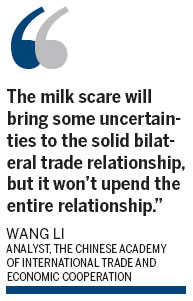
The country's total exports to China have almost tripled since 2008, rising from $2.1 billion to $6.1 billion in 2012.
The nation's largest category of exports to China in 2012 was dairy products: milk powder, butter and cheese, with a value of $2.2 billion.
"As one of the world's biggest dairy producers, the crisis is damaging the reputation of dairy products from New Zealand, which supplies more than 80 percent of China's imported milk powder.
"Chinese consumers will shift to dairy products from other countries for the time being," said Liu Wenge, a professor at the Central University of Finance and Economics in Beijing.
However, Liu and other experts see the crisis as having just a limited, short-term impact on the country's dairy exports to China. The position of broader New Zealand products will not be shaken among Chinese consumers.
"China will not shut the door to such a big dairy supplier in the long term," said Mei Xinyu, a senior researcher with the Ministry of Commerce.
The reality is that Chinese consumers have sought out imported dairy products because of their lack of confidence in domestic brands, as well as their regard for foreign labels.
"It will not take long for consumers, who tend to buy high-end foreign labels, to go back to New Zealand dairy products once the crisis passes," said Mei.
Further, Mei said, the contamination isn't a systemic issue for Fonterra, but just an accident at a small factory. The contamination is said to have stemmed from a dirty pipe at a Waikato factory.
"New Zealand's other industries will not be affected," said Mei.
The rebuilding of New Zealand's dairy market share in China also depends on whether the government and any company involved with the problem deals with the crisis correctly, experts said.
"At the very least, it has caused panic among Chinese consumers. Once New Zealand resolves (the issue) actively and honestly, the market will rebound in about one year," said Wang Li, an analyst at the Chinese Academy of International Trade and Economic Cooperation, a government think tank.
The New Zealand-China Free Trade Agreement was the first free trade pact that China signed with any developed country. It took force on Oct 1, 2008.
- Regulator calls for stepped up supervision of milk
- Domestic milk powder production licensees listed
- Tainted NZ milk powder
- Importers recall tainted NZ milk powder
- New Zealand milk stokes fears
- Fonterra in battle with Sri Lankan authority
- Fonterra CEO addresses media
- Fonterra promises 'extreme care' in Taiwan trade
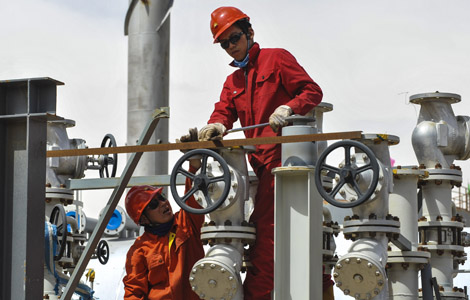
 PetroChina poised to dominate Iraqi oil
PetroChina poised to dominate Iraqi oil
 Printed bones
Printed bones
 Marriage attitudes slowly change
Marriage attitudes slowly change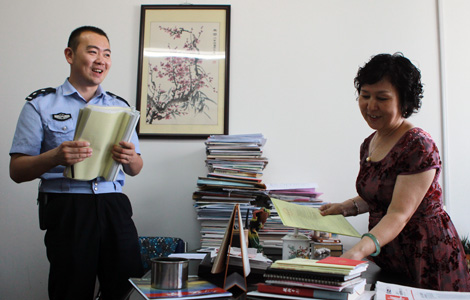
 On frontline of fight against crime
On frontline of fight against crime
 Bird flu, slowdown hit sales at fast-food chains
Bird flu, slowdown hit sales at fast-food chains
 Apartment owner told to dismantle roof-top oasis
Apartment owner told to dismantle roof-top oasis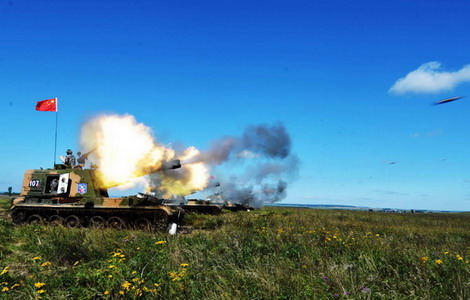
 Highlights from 2013 China-Russia drill
Highlights from 2013 China-Russia drill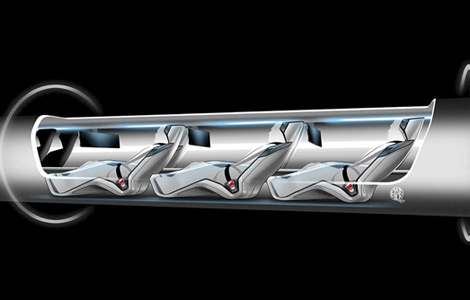
 Billionaire unveils 'Hyperloop' transport system
Billionaire unveils 'Hyperloop' transport system
Most Viewed
Editor's Picks

|
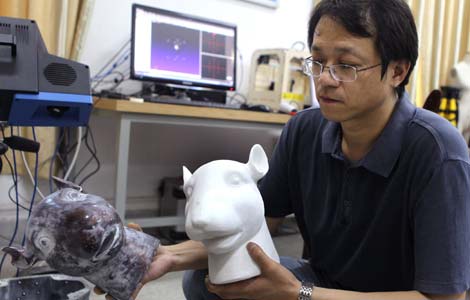
|

|

|

|

|
Today's Top News
Friends of accused Boston bomber due in court
Economic hub on Bohai Bay
Chinese as assistant secretary-general
Hot times mean hotter prices
Donors of organs easing transplant shortages
China feels worst heat in half-century
Printed bones
Weather bears down on rice
US Weekly

|

|




